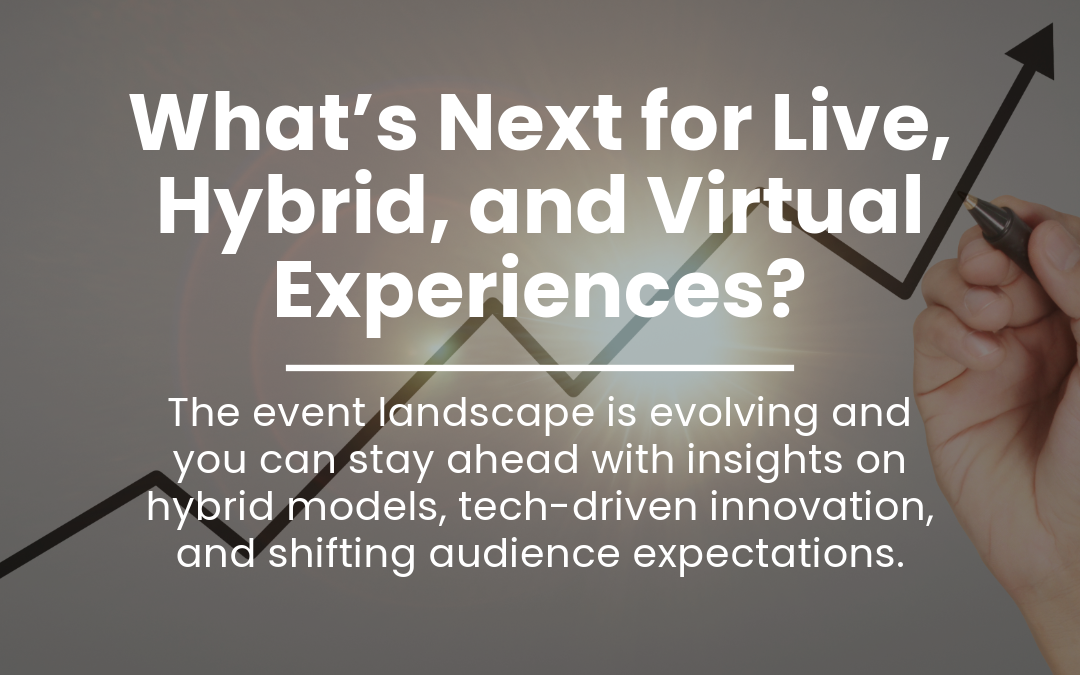Share this blog
The event industry is undergoing a seismic shift, and if you thought the last few years were wild, hold onto your lanyards because 2025 is shaping up to be a game-changer. The buzzwords? Hybrid events and technological integration. And no, we’re not talking about robots taking over your job—though that might spice things up.
The Rise of Hybrid Events
Hybrid events are no longer the awkward cousin nobody talks about at family gatherings. They’re the life of the party. According to a survey by Bizzabo, “97% of respondents expect to see more hybrid events going forward.” Josh Howarth from Exploding Topics notes that “hybrid events allow for the flexibility and reach of a virtual event, but the connection and engagement of an in-person option.”
But not everyone is buying into the hybrid hype without reservations. The team at Event Marketer magazine compiled insights from industry leaders like Elle Chan, Co-Founder & CEO of Trademark, who are cautiously optimistic about the trend. As they put it, “There’s a helluva lotta conversations going on across the experiential ecosystem as brands, agencies and partners get next year’s events moving today—in hopes that tomorrow’s experiences blow the doors off yesterday’s.”
Technological Innovations Driving Change
Event technology is evolving faster than a DJ can ruin your favorite song. The global event management software market is projected to reach around “USD 22,022.4 Million by 2033,” according to a report by Custom Market Insights. The report highlights that “Digital Transformation” and “Rising Demand for Automation” are key growth factors.
Partnerships and acquisitions are further fueling this growth. For instance, “In 2024, Zoom and Swoogo have partnered to integrate Zoom Events’ virtual platform with Swoogo’s in-person event management technology,” expanding the capabilities for hybrid events.
The Live Event Dilemma: Funflation vs. Cost-Consciousness
While technology is making events more accessible, there’s a twist—enter “funflation.”
Deloitte’s report highlights that “rising entertainment costs are often a concern for consumers.” The report notes, “A majority of consumers surveyed (64%) said they were frustrated that the entertainment services they subscribed to continue to raise their prices.”
This tension creates both challenges and opportunities. As live event hype goes up against cost-conscious consumers, hybrid events might be the compromise that keeps everyone happy—or at least, less grumpy.
The Future is Now: Embracing Change
The expansion of large-scale festivals like Coachella and Glastonbury is redefining the live music landscape. A report by ResearchAndMarkets.com states that “The global market for Live Music was estimated at US$28.1 Billion in 2023 and is projected to reach US$79.7 Billion by 2030.”
Technological innovations are not just limited to event management software but are transforming live experiences. The same report mentions, “Technological advancements are playing a pivotal role in transforming the live music experience, making it more interactive, accessible, and engaging.”
The Balancing Act
While some industry experts are excited about these changes, others urge caution. Howard Givner, founder of the Event Leadership Institute, predicts a shift “From [a] revenue source to [a] marketing vehicle,” as quoted in Josh Howarth’s article on Exploding Topics.
So, where does this leave event professionals? Probably juggling more balls than a circus performer. But hey, who said the event industry was boring?
The event industry is at a crossroads, with hybrid formats and technological integration leading the way. As consumer demands shift towards accessibility and engagement, professionals need to adapt or risk becoming obsolete faster than you can say “virtual breakout room.”
Finding the right people makes all the difference! Hire a vetted event professional ready to seamlessly support your team whenever and wherever they are needed.

